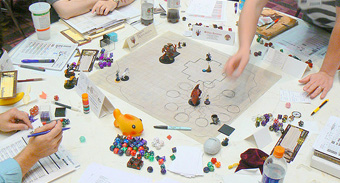THE THEOLOGICAL ENGINEER
Dungeons & Dragons
By Jeff Laird

In my personal case, I was a "Dungeon Master" for several years. This is the person who creates the scenarios and oversees the role-playing during the game. I don't participate any more, but that honestly has more to do with having a full-time job, children, and a ministry to take up my time. I didn't feel led to shed it like some kind of personal sin, and I still have all of my books and dice.
Based on that experience, I'd have to say that the majority of Christian objections to games like D&D are based on a lack of information. I suppose anybody could add overtly Satanic elements to just about anything. But role players in D&D aren't actually supposed to chant, recite incantations, or pray to nonexistent deities. They guide fictional characters by saying things like, "I'll cast my magic missile spell at the Goblin." It's essentially a game of "let's pretend" using dice and lots and lots and lots of books.
There is considerably more graphic content — physical and spiritual — in modern video games than one could actually see in a Dungeons and Dragons session. The fact that the D&D world is overt fantasy also matters: there's not much connection to the real world. As to whether or not this counts as "fantasizing" about sin, that's not my personal opinion, since the point is that the world in question does not actually exist. The characters aren't even disobeying God, since the idea is a world/universe that is different from ours. This is similar to a fantasy scenario such as the Chronicles of Narnia series, where there are different beings and different creation stories, but few people object to those on religious grounds.
On a lighter note, the bigger threats of tabletop gaming like D&D are probably related to one's health. Or "cool" reputation. The prevalence of Cheetos, Mountain Dew, awkward personalities and general dork-dom in role-playing has become cliché. Not true, of course, but the first thing most people in the real world think of when they hear "Dungeons and Dragons" isn't "SATAN!" It's "NERDS!" I've been on both sides of that coin, so take my word for it, D&D is one of the least-nefarious things one can participate in.
Physically, it's common sense to say that becoming absorbed in fantasy worlds, and sitting on your butt while you do it, isn't the most energizing activity. Like any hobby, it can become distracting. But then, so can fishing, gardening, or any other pastime.
Of course, not all games are created equal. There are role-playing games which do have an overtly "evil," dark, or anti-Christian flavor to them. Certain types of characters, scenarios, or actions should give a Christin pause, much like they would when choosing which movie to watch. The artwork on the covers, and inside the pages, can certainly cross the line from "adventure fantasy" to "sexual fantasy." That, of course, is spiritual noise no Christian needs.
That being said, the most important principle to keep in mind is that of Christian liberty, best described by Romans chapter 14. This cuts in both directions. If a person has a solid spiritual life, and feels they can participate in "let's pretend" games involving magic and dragons, then there is no explicit scriptural reason why they cannot. Other Christians should be careful not to judge such brothers and sisters. On the other hand, those who feel that these games are not for them should not participate — anything they are not fully convinced of is, for them, a sin (Romans 14:23).
And, both sides of the issue need to keep in mind that it's also a sin to cause division among brothers and sisters in Christ. If a fellow believer, or even a non-believer, does not share our preference, we need to be careful not to force our view on them. Rubbing it in someone else's face, either by flaunting their participation, or aggressively condemning those who do, are both wrong.
Those principles apply to all of these games and videos. Of course, there are extremes that make the decision a little easier. I, personally, wouldn't play a D&D game where the player characters are all evil, and are rewarded for doing wicked things. Nor would I play a video game with sensuality, sex acts, sadism, and so forth. The point is not that there is never something wrong with these games, only that there isn't always something wrong with them.
Much like music, painting, or dance, the medium is not the issue. There is nothing inherently Satanic about imaginative games, rolling dice, or Tolkien-style fantasy. No more than there is something inherently erotic about dance, or rebellious about music, or idolatrous about sculpture. The specifics matter, and they matter more than uninformed generalities.
Image Credit: Benny Mazur; "My players Saturday morning"; Creative Commons
Tags: Biblical-Truth | Christian-Life | Controversial-Issues | Reviews-Critiques | Sin-Evil
comments powered by Disqus
Published 11-30-15

